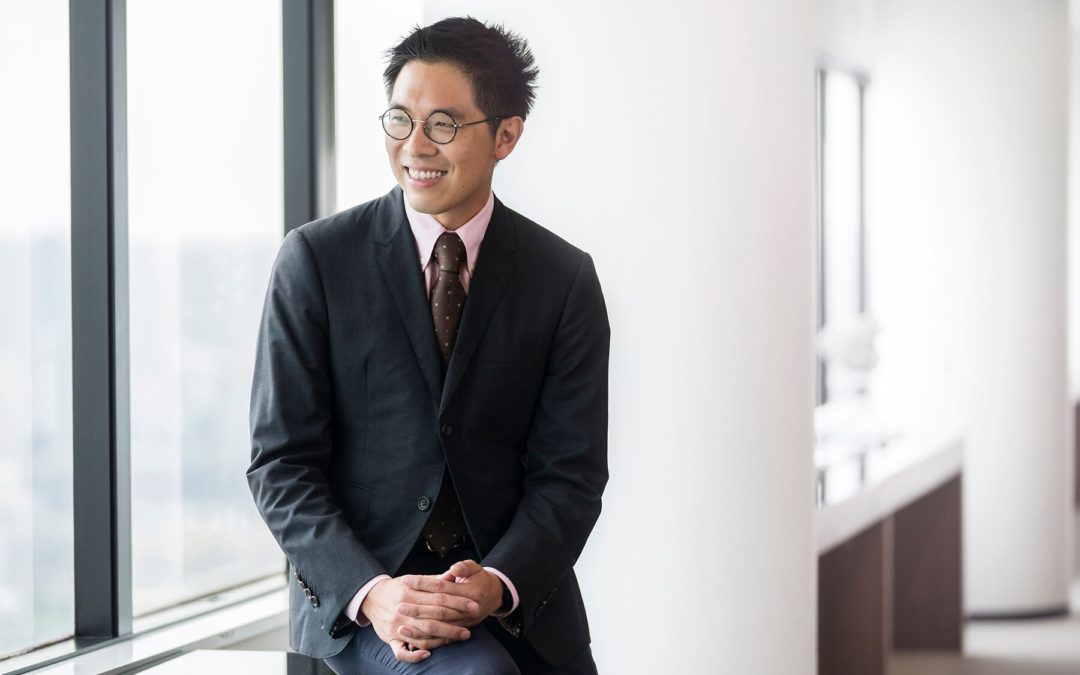Chng Kai Fong is the Managing Director of the Singapore Economic Development Board (EDB), a government agency that is responsible for enhancing Singapore’s position as a global centre for business, innovation and talent. Prior to EDB, Kai Fong was the Principal Private Secretary (PPS) to the Prime Minister (PM) for three years.
Kai Fong graduated from the University of Cambridge with a Master in Engineering in 2001, specialising in signal processing. In 2011, he was awarded the Lee Kuan Yew Scholarship and is also a Sloan Fellow with a Master of Science in Management from Stanford University’s Graduate School of Business.
Kai Fong is married with two daughters and a son. In his younger days, he freelanced as a Euphonium player and an amateur conductor. These days, he waves his hands when classical music is playing on the radio, to the bewilderment of his children.
On the catalyst for joining public service:
Singapore is moving so fast that things change every five to ten years – different mindsets, philosophies and exposure. It was a different paradigm all together in the past. I did not have a real choice back then and neither was I aware of the various jobs which were made available. Thankfully, I surprised myself by performing quite well in “A” Levels and was presented with two scholarships – the PSC Scholarship and EDB Scholarship. I applied for the PSC Scholarship and entered Cambridge to study Engineering eventually since it gave me more options. Furthermore, my motivation comes from finding the true meaning of my job and serving within the public service could fulfil that.
On questions one should ask when deciding on a career path:
I go through Peter Drucker’s Managing Oneself article every year. It essentially allows you to get a sense of what your strengths, weaknesses, and values are. Additionally, all the frameworks out there are only useful to a limited extent, but the most important thing is still reflection and understanding what drives you and what motivates you. The journey is definitely what counts, not the actual end point. This is why I highly encourage everyone to evaluate themselves at each stage of life.
Secondly, how do you increase your own option value to remain adaptable? I personally increase my option value through expanding my skill sets and experiences. The typical way our school system has tried to groom our students leads them down the path where we try to be the best of the best. This causes us to be very one-track minded. Therefore, rather than focusing on being the top Nobel Prize winner or the top 0.1%, majority of us should develop skills in three or four different dimensions which lands you in the top quartile of people. A few important skills to get you there are presentation and networking abilities, which SMU really trains current undergraduates well in. This blend will make us a very unique individual when it comes to creating a strong narrative to market ourselves to the future employer.
Lastly, young people are always in the rush to build depth and capacity, but the truth is there is always time. One example is choosing between a MNC and a start-up. All these life choices are just stepping stones and we must always be conscious that there are always pros and cons both ways. This again leads me to my first point of being clear of what you are committing to and what you will get out of the experience. Being open to new opportunities and experiences especially in the early stage will help one to build breadth, foundation and option value for the future as well!
I was very fortunate to spend some time with American Billionaire Ray Dalio in San Francisco recently and what amazes me most is how he feels that everything can be made into an algorithm on how to live your life. He developed this set of principles by listing down the decision-making process on why he made a certain trade each time and what are the factors. He always tries to understand the causal effects behind a certain outcome and overtime he developed patterns and principles for his investments, which he similarly did for life. Therefore, it is always important to figure out your decision-making process and what are the values guiding you to take on a certain role.
On mentorship and role models:
Who will remember you the most? The person you have helped or the person whom you have asked for help? It is always the person whom you have asked for help, because he or she is invested in you.
I always ask my young officers to ask for help. There are actually a lot more people who are willing to help you than you actually realize. When you invite others to help you, you will be surprised how powerful mentoring is.
I was seconded from 2008 to 2010 as a Senior Management Consultant to Shell in its Downstream Strategy Division. During this tenure, one thing I did was to deliberately understand how Shell works, how they select their leaders, what are their attributes and what was going on inside their talent recruitment process. At one point, I even emailed the most senior staff directly to get one hour of his time. It all starts with asking for help. Moving forward, I landed in my second job rotation within the civil service as a result of asking help from a Deputy Secretary at that point in time. That set me on a path for my next boss and so on and so forth.
Help begets help along the way, and you start to build knowledge and networks. Today, these mentors are still invested in me and we meet up regularly while keeping it a two-way relationship through exchanging of feedback to help each other improve.
On dealing with pressure, setbacks and failure:
I do not take rejection personally. Sometimes, a “No” may become a “Yes” after a long time so keep going at it. The problem with setbacks and failures is that we tend to assume a mindset of blaming ourselves. Nonetheless, I feel it is important to own it and have that internal locus of control to understand what went wrong. The worst is the fixed mindset where we blame all other external circumstances. Again, this is why reflection is so important. Resilience also comes when you do not take yourself so seriously.
On the best part of his job:
I love meeting interesting people, talking and learning from them every single day. I was just at Los Angeles for a conference and many of them were sharing very personal stories which really connected with me through its rawness and emotions. I also met a rapper who described to me his entire journey since collaborating with Dr Dre, a songwriter for Avicii and an architect who started her own jewellery studio business. I really like conversations when people are open and willing to share. They key thing is to leave options and space for serendipity so that you can learn from others and again increase your option value. That being said, a very simple yet powerful tactic which TMC can perhaps adopt is to create small sharing groups to discuss personal stories or struggles. This will cause students to reflect upon themselves, empathize, and learn from the process. I believe we learn best through fostering internalization and self-reflection rather than merely receiving advice from others.
On the greatest challenge for the next generation of public servants:
How do you feel that you can drive change without being snuffed out by the bureaucracy order? The clock speed of change is actually moving very rapidly with every single one of you at the forefront and knowing what is happening on the outside. As I have mentioned, every five to ten years makes a huge difference and now we have a whole new system of social media and working on the Cloud. Inadvertently, many people who join gets very frustrated with the service because the clock speed of our system is so much slower than the clock speed of the world that we currently live in. Therefore, maintaining the internal locus of control to feel that the system can adapt to you is key.
On his top leadership advice:
We are living in a performance culture and always feel that others are judging us. Nonetheless, I feel that it is very important to keep it real and transparent, while remaining integrity.
On his advice to current undergraduates:
Reflect, ask for help, and increase your option value.



Recent Comments